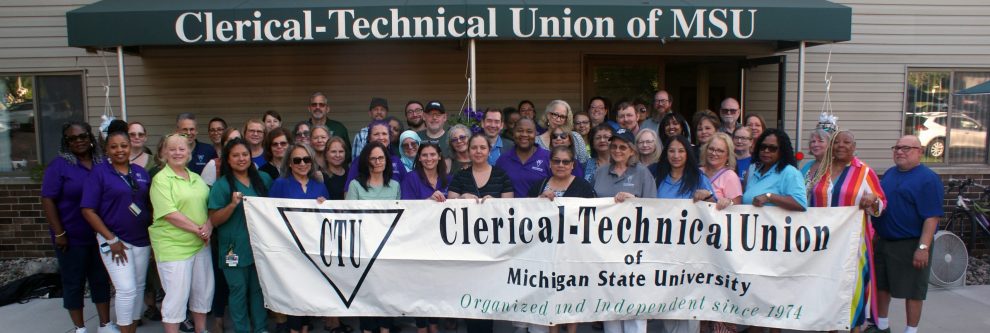When we are asked to burn the candle at both ends by putting in overtime, we all agree we should receive extra compensation. In fact, it’s the law.
According to the Fair Labor Standards Act (FLSA), overtime of at least one and one-half times an employee’s regular rate must be paid after 40 hours worked in a week. Operating within this requirement, employers are able to offer and unions are able to negotiate more favorable arrangements.
Since ratifying our CTU/MSU contract last year, there has been some confusion about how overtime compensation (Article 9) works for CTs.
Overtime based on hours worked
The biggest change in our 2011 overtime language is that overtime now is computed based on hours worked in a week rather than hours paid.
Under our previous contract, paid time off—such as vacation, sick, personal, funeral, compensatory—counted toward the basic 40, after which we received overtime pay at one and one-half times our regular rate.
This was more generous than required by the FLSA, a situation the University found increasingly costly (when accounting for all MSU labor groups) and difficult to justify to hostile legislators looking to slash college budgets.
Your negotiating team fought to keep our original overtime language, arguing that CTs are not in a position to abuse overtime, that our overall usage is low and that a change might be abused by some supervisors. The union did not prevail in this argument (although we did reject an MSU attempt to drastically alter the manner in which employee work schedules could be modified, a change that would have affected overtime benefits significantly).
New contract language affects overtime only
– Sick, Vacation, other time not impacted
Under the new Contract, we still get paid vacations, sick time, personal hours, etc. And we continue to be paid for every hour of work. However, pay is at straight time until we have actually worked 40 hours in a week.
For example, if we call in sick on Monday, we will receive sick pay for the day. If we work or have other paid time off during the remaining 32 hours of our regular week and are required to work Saturday, we will be paid for the eight sick hours and the 40 hours of work—a total of 48 hours paid at straight time with no time and a half.
The exception is holidays. “Hours worked” for purposes of calculating overtime shall also include paid holidays provided that the employee works the regularly scheduled work day preceding and following the holiday. In other words, if a holiday falls on a Monday, we still get overtime pay if we take the holiday, work 32 regular hours and are scheduled for extra Saturday or evening hours.
(And, FYI, anyone working on a university designated holiday will continue to be paid holiday pay at two and one-half times their regular wage.)
Note that all of these computations are based on the work week—Sunday at midnight until 11:59 p.m. the following Saturday. So, actions taken on a Friday do not affect overtime computations the following week.
We need to know our rights!
It is important to know how overtime works. Otherwise, we may needlessly give up important legal rights. However, the issues are frequently unique and often confusing. Union Representatives or Contract Administrators (355-1903) can answer questions or assist with supervisors who give advice that conflicts with our contract.
Modification of schedule
It is especially important to pay close attention when a supervisor decides to modify one of our work schedules.
Almost every CT has an established work schedule, usually from 8 to 5 with a one-hour lunch, Monday through Friday. To change that schedule, the supervisor must notify the employee at least one day prior to her or his two consecutive days off (for most, that’s by Thursday at 5 p.m.).
Under our contract, if we do not receive advance notification of a change, we have the right to overtime pay, even if we didn’t exceed 40 hours in that work week. In this area, the CTU contract continues to provide more than the law.
For example, if we are asked to work late on a Monday evening and told to “just come in late tomorrow morning,” we have the right to insist on being paid overtime. We can agree to take straight time within the same work week, but we are not required to do so.
Comp time
Comp time is a way of paying overtime. Rather than time and a half in money, however, we receive it in hours. According to article 9, section 1D, of our contract:
“Schedules shall not be altered for the purposes of preventing payment of overtime. If mutually agreed, equivalent time off may be scheduled within the work week. However, if scheduled outside the work week, compensatory time shall be taken at time and one-half.”
Compensatory time is scheduled by mutual agreement, and many members enjoy the extra time at a later date. But we shouldn’t be coerced into giving up our right to overtime pay.
Comp time does have some problematic aspects. Many departments just have too much work. Anyone who has trouble getting vacations, for example, should choose overtime pay instead of comp time. Also, using comp time actually interferes with our ability to earn hours toward overtime (because it is reported as hours paid, not hours worked).
Giving ourselves away
Many CTs voluntarily give away their time to the University, according to reports by our URs who work with employees every day. Several URs have expressed concern about CTs staying late, coming in early, skipping breaks and lunch hours, all without overtime pay or compensatory time.
Sometimes, we give away our time because it is difficult to leave important tasks undone. Since there’s no extra money in the budget to hire additional staff, we feel obligated. Other times, individuals are afraid of not keeping up. Besides, who is harmed if a CT decides to give up breaks?
The consequences of working without pay are clear according to URs who work with CTs in the districts. The first thing URs usually notice is that once a CT begins to give away time, the department comes to expect it. Rather than catching up, the CT may actually receive more work.
Sometimes a CT keeps his or her head down and continues to plow through. Frequently, however, the resulting stress builds resentment, decreases productivity and/or contributes to illness. Another consequence is that supervisors may start comparing coworkers to a CT who is giving away time, pressuring them to do additional work or show the same “dedication.” This causes resentment between coworkers and eats away at workplace morale.
Keep in mind that “stress” is not a great defense against discipline even if it contributes to decreased productivity, increased errors or conflict.
Yes, these are management problems that supervisors should guard against by making sure that employees work only the hours for which they are paid, that work is evenly distributed, and that employees receive all appropriate breaks. In fact, merely allowing CTs to work without pay is a violation of the FLSA. However, supervisors sometimes get caught up in the immediate bottom line, and we can help by making sure they know when there is too much work for the hours available. If our supervisor knows we are working overtime and does not tell us to stop, we are entitled to payment.
For members assigned more work than can be completed in a given amount of time, the CTU provides a “Work Overflow Form” that can assist in discussing our workloads with our supervisors. This form should be used in the event that too many tasks have been assigned to complete in a required amount of time. The form should be completed and submitted to the supervisor as a request to prioritize tasks in the order of importance with an updated and reasonable completion date. Members are advised to consult with a UR or Contract Administrator before taking this action.
We need to look out for ourselves. Let’s say an individual CT works without pay an extra half hour a day (part or all of lunch hour, skipping breaks, leaving late, etc.). It adds up to 130 hours a year. Subtract 20 hours to cover holidays, vacation and miscellaneous absences. Multiply the remaining 110 hours by the average CT hourly rate of $19.31 and the CT has donated $2,124—calculated at straight time, not overtime, rates—an unacknowledged donation that can’t even be claimed on taxes.

